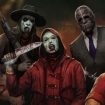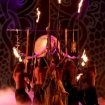It was such a pleasure to fall in love with the DOOM reboot back in 2016. The legacy PC shooter had fallen dormant after DOOM 3's phantasmagoric journey to Hell — released back in the already-hard-to-remember summer of 2004. Since then, it's felt like the games industry had slowly matured out of the gory excess that served as the franchise's calling card. Call of Duty games now touch on the military-industrial complex, Assassin's Creed excoriates the fallacies of Catholic ontology and God of War's Kratos has been recast from a bloodthirsty maniac to a deeply flawed dad with a load of regrets on his back.
So maybe DOOM had to grow up, too. When Bethesda started resuscitating id's most famous properties, the company transmogrified Wolfenstein from a gleefully puerile, ahistorical Nazi corridor shooter to a shockingly relevant meditation on the latent forces of white supremacy that lie untapped in the global community. But how do you do something similar with DOOM, with its chittering demons, and infested Martian bases, and one-way trips to Hell, and quad-damage power-ups? Is there truly a way to build a suitable successor that reflects a higher purpose out of those ingredients?
As it turns out, there wasn't. Instead, Bethesda and id set out to create the most glorious, satisfying arena shooter in decades, and they pulled it off with flying colors. 2016's DOOM might be a tad smarter then its predecessors, with its sardonic characters, tongue-in-cheek religious undertones and a plot that centers around "Hell Energy" — literally, a futuristic corporation that powers the Earth by tapping resources found in the underworld. But gameplay-wise, DOOM traded in that same Nineties gluttony. You chainsawed and shotgunned an army of darkness for hours in what was probably the most stripped-down, essentialized design doc ever perfected by a triple-A studio. Somehow it was also the most satisfying thing many of us had played in years.
A lot of that success can be chalked up to Mick Gordon's score, which perfectly married the gothic MIDI brutality of the early DOOM games with a more modern, heavy-metal symphonia. He effortlessly wrapped in everything from bone-chilling synth work to jagged guitar riffage, and arrived at a place that seemed like a summation of the previous two decades of industrial music. This summer, Gordon's soundtrack will be pressed on a four-record box set, complete with wax dipped in a authentically DOOM-y crimson (the vinyl is available for purchase in a variety of packages via Laced Records). We caught up with the composer recently and asked him about what it's like picking the right instruments for Hell, the aesthetic benefits of composing for video games and the challenges of being badass without artifice.
YOU'VE WRITTEN FOR DOZENS OF GAMES NOW, AND IT REALLY SEEMS TO BE YOUR SPECIALTY. HOW DID YOU FALL INTO VIDEO GAME SCORING, MORE SO THAN FILM OR TV SCORING?
I grew up with games. I'm a huge fan and the game industry combines a bunch of different things that I find really interesting. The general approach to producing music for games is largely similar to music in any other medium. You're still producing music with the same tools as everyone else who produces music. However, games have an additional unique technical requirement where you have to develop ways for the music to play back in-game based on what the player is doing. That's something totally unique to games and it very much informs how the audience enjoys the music.
DOOM DRAWS ON A RICH LINEAGE OF GREAT MUSIC, AND I LOVE HOW THE NEW GAME EVOKES THOSE OLD NINETIES MIDI TUNES, WHILE STILL BLAZING ITS OWN PATH. WHAT WAS THE ARTISTIC PROCESS FOR YOU LIKE, WHEN YOU SAT DOWN TO WRITE A SCORE THAT KEPT A BALANCE BETWEEN OLD AND NEW?
I've been so incredibly fortunate to be involved with a few franchises that began their lives during the Nineties and it is always a daunting task. It is certainly made easier if you're a huge fan of these franchises. I can always ask myself, "As a fan, what would I want to hear?" It's important to define what the game is in the beginning. Is it a remake? Or does it do something new? With DOOM, we really wanted to musically highlight the amazing sci-fi visuals that the art team were building. That was the first thing that inspired the musical direction. The futuristic element. Once you've nailed down the "sound" and overall direction, it's important to define what made the original DOOM special. For me, that was the fast-paced combat intense combat paired with fast music. It's panic, but there's a strong element of groove that comes from the fluid movement. Once you've decided on that, you attempt to find ways to illustrate that same feeling in a modern way.
WHAT WAS IT LIKE PLAYING THE SCORE LIVE AT THE GAME AWARDS 2016?
Yeah, we've only done a little bit so far, but of course it's a lot of fun. It was a dream for me being able to play alongside Sascha Dikiciyan and Matt Halpern. Sascha's music has always inspired me — it sounds like it comes from a place far off in the future. He's someone I always listen to and I can't reverse-engineer how he does things. Matt is just a powerhouse of a musician. When I was running past his kit onstage, each time he hit the drums the air pressure would compress my chest. They're both absolutely lovely to work with and awesome people to be around. I'm hoping to do more comprehensive shows next year. There's a lot to put together but we definitely want to take a show to various parts of the world.
ARTISTICALLY, WHAT WERE THE DIFFERENCES FOR YOU BETWEEN COMPOSING FOR THE LEVELS SET ON MARS AND THE LEVELS SET IN HELL?
The Mars areas in DOOM 2016 primarily have two types of environments. One is very industrial, with giant machines all covered in rust and red Mars grime. The second is very high tech, with lots of glass and shiny metallic surfaces. What both Mars environments have in common is the fact that they're human. Musically, that meant that each received a treatment that was more grounded in music that reflected humans. As the environments were created by humans, even though they're on Mars, the music needed to sound like humans created it, too. Once you've got that down, you can define an opposing sound for Hell. That lead to Hell being more atonal, dissonant and weird. Discordant. Less-structured, etc. It's important to define each area clearly, especially in a game like DOOM where the Mars and Hell environments are so tied to the series.
YOU ALSO JUST DID THE SCORE FOR WOLFENSTEIN 2, WHICH IS A GAME WITH LOT MORE CINEMATICS. AS A GAME COMPOSER, HOW IS THE PROCESS DIFFERENT WHEN YOU'RE WRITING FOR A GAME LIKE DOOM, WITH A LOT OF LONG, CORRIDOR-BASED LEVELS, AND A GAME LIKE WOLFENSTEIN, WHERE THE CAMERA IS CONSTANTLY GOING TO SWING OUT, AND SHOW THE CHARACTERS ENGAGED IN WHAT'S BASICALLY A MOVIE SCENE. DOES THAT CHANGE THE PROCESS AT ALL FOR YOU?
Every game is different. There's honestly no general approach that suits everything. Wolfenstein has a lot more narrative moments — a lot more. There are many cutscenes [a sequence in a video game that is not interactive, breaking up the gameplay] and essentially you're scoring a movie alongside the game. During those cutscenes you're able to establish themes that are emotionally linked with the story. When you pull those themes out of the cutscenes and bring them into gameplay moments, it can create a very strong narrative experience. Whereas on DOOM, the combat is the story. Everything is set up for the player to have the most meaning during combat. Therefore, musically, the best themes need to be combat themes. When the player hears that combat theme they enjoy revving up during their current combat encounter, that creates a strong narrative experience for them.
DOOM IS AN INCREDIBLE GAME WITH INCREDIBLE MUSIC, BUT IT ALSO TOOK A LOT OF PEOPLE BY SURPRISE. I DON'T THINK PEOPLE EXPECTED IT TO BE NEARLY AS AWESOME AS IT WAS BEFORE RELEASE. WERE YOU AND THE REST OF THE TEAM AWARE THAT PEOPLE WEREN'T NECESSARILY SUPER EXCITED ABOUT THE GAME? AND DID THAT ADD ANY MOTIVATION TO MAKE SURE THE END PRODUCT WAS MORE BADASS?
You approach every day like you're making the most badass thing possible because that's your job. You aim to do the very best every time. Of course, you're not at all in control over how the public accepts whatever you've worked on. Ultimately, all you can do is make a game that you'd want to play. If you stick to producing something that inspires you and keeps you motivated during the production, it will find an audience.







